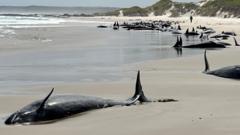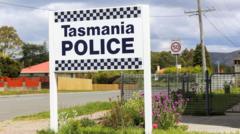In a heartbreaking event along the Tasmanian coastline, around 90 false killer whales will be euthanized following a significant stranding incident.
Tragic Euthanasia Decision for False Killer Whales After Tasmania Mass Stranding

Tragic Euthanasia Decision for False Killer Whales After Tasmania Mass Stranding
Authorities in Tasmania face difficult choices as mass whale stranding leads to euthanasia of survivors.
Following a mass stranding of approximately 157 false killer whales near Arthur River in Tasmania, Australian authorities have made the agonizing decision to euthanize around 90 surviving whales. Experts evaluated the conditions and found them extremely challenging for rescuing the stranded animals. Tragically, the incident marked the first mass stranding of false killer whales in over five decades for the region, raising concerns about the future of these marine mammals.
Local resident Jocelyn Flint expressed her distress at witnessing the situation firsthand after her son discovered the pod while on a fishing trip. “There are babies... There’s just families of them. Their eyes are open, they're looking at me, like 'help'," Flint recounted to the Australian Broadcasting Corporation, describing the harrowing scene.
The location of the stranding poses additional complications due to its rugged terrain and difficult accessibility. Marine biologist Kris Carlyon noted, "This is possibly the trickiest location I've seen in 16 years of doing this role in Tasmania." Attempts to rescue the whales have proven futile, as expert responders struggled to return the animals to the ocean. Poor weather conditions and rough terrain hindered rescue efforts, necessitating the difficult choice to move forward with euthanasia as a final resort.
Dr. Carlyon lamented, "The longer these animals are stranded, the longer they suffer. All alternative options have been unsuccessful." The euthanasia procedures are expected to commence on Wednesday and may extend into Thursday, as authorities contemplate how to handle the carcasses in an area of cultural significance for Aboriginal people.
Sadly, Tasmania has witnessed a series of whale strandings in recent years. High-profile incidents in 2020 saw over 470 pilot whales become stranded in Macquarie Harbour, with about 350 losing their lives despite rescue attempts. Scientists continue to investigate the reasons behind such mass strandings, theorizing that disorientation while pursuing prey or leading strays might be responsible.
Whales are known for their strong social bonds, often traveling in cohesive groups, which can make mass stranding incidents tragic for the entire pod. As push and pull of nature unfolds, the focus now turns to the remaining whales and the best way to honor their memory in light of this increasing phenomenon in Tasmanian waters.
Local resident Jocelyn Flint expressed her distress at witnessing the situation firsthand after her son discovered the pod while on a fishing trip. “There are babies... There’s just families of them. Their eyes are open, they're looking at me, like 'help'," Flint recounted to the Australian Broadcasting Corporation, describing the harrowing scene.
The location of the stranding poses additional complications due to its rugged terrain and difficult accessibility. Marine biologist Kris Carlyon noted, "This is possibly the trickiest location I've seen in 16 years of doing this role in Tasmania." Attempts to rescue the whales have proven futile, as expert responders struggled to return the animals to the ocean. Poor weather conditions and rough terrain hindered rescue efforts, necessitating the difficult choice to move forward with euthanasia as a final resort.
Dr. Carlyon lamented, "The longer these animals are stranded, the longer they suffer. All alternative options have been unsuccessful." The euthanasia procedures are expected to commence on Wednesday and may extend into Thursday, as authorities contemplate how to handle the carcasses in an area of cultural significance for Aboriginal people.
Sadly, Tasmania has witnessed a series of whale strandings in recent years. High-profile incidents in 2020 saw over 470 pilot whales become stranded in Macquarie Harbour, with about 350 losing their lives despite rescue attempts. Scientists continue to investigate the reasons behind such mass strandings, theorizing that disorientation while pursuing prey or leading strays might be responsible.
Whales are known for their strong social bonds, often traveling in cohesive groups, which can make mass stranding incidents tragic for the entire pod. As push and pull of nature unfolds, the focus now turns to the remaining whales and the best way to honor their memory in light of this increasing phenomenon in Tasmanian waters.



















